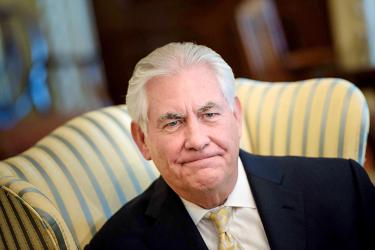New US Secretary of State Rex Tillerson recently reaffirmed the “six assurances” regarding US policy toward Taiwan in response to questions from US Senator Ben Cardin before the US Senate confirmed him as the country’s top diplomat on Feb. 1.
In the written responses, Tillerson said that the Three Joint Communiques, the Taiwan Relations Act (TRA) and the “six assurances” provide the foundation for US policy toward Taiwan and China, adding that the US should continue to uphold its “one China” policy and support a peaceful and mutually agreeable cross-Taiwan Strait outcome.
Tillerson was replying to Cardin’s questions regarding whether the principles of the communiques and the TRA remain the important foundations of the US-China relationship and whether he believes that the “one China” policy remains valid or needs revision.
He also said that if confirmed, he intends to support the “one China” policy.
Tillerson was also asked whether he was concerned that US President Donald Trump’s suggestion in an interview in December last year that the “one China” policy was negotiable might have created the impression that Taiwan is nothing more than a bargaining chip and might undermine the US’ ability to support Taiwan and protect US interests in peace and stability in the region.
“The people of Taiwan are friends of the United States and should not be treated as a bargaining chip. The US commitment to Taiwan is both a legal commitment and a moral imperative,” he said.
Under the “one China” policy, the US recognizes the People’s Republic of China as the sole legal government of China and acknowledges the Chinese position that Taiwan is part of China, Tillerson said.
As required by the TRA, the US continues to provide Taiwan with defensive arms and maintains the capacity to resist any resort to force or other forms of coercion that would jeopardize the security, or the social or economic system, of the people of Taiwan, Tillerson wrote.
He said that the US also upholds the “six assurances” toward Taiwan, adding that, if confirmed, he would continue these policies and work to ensure that the cross-strait military balance remains favorable to peace and stability.
Tillerson first mentioned the “six assurances” at his confirmation hearing before the Senate Committee on Foreign Relations on Jan. 11.
Then-US president Ronald Reagan issued the “six assurances” in 1982, which include pledges not to set a date for ending arms sales to Taiwan, not to hold prior consultations with China regarding arms sales to Taiwan and not to play a mediation role between Taiwan and China.
They also promise that the US will not revise the TRA, will not pressure Taiwan to enter into negotiations with China and will not formally recognize Chinese sovereignty over Taiwan.
Source: Taipei Times - 2017/02/10





















